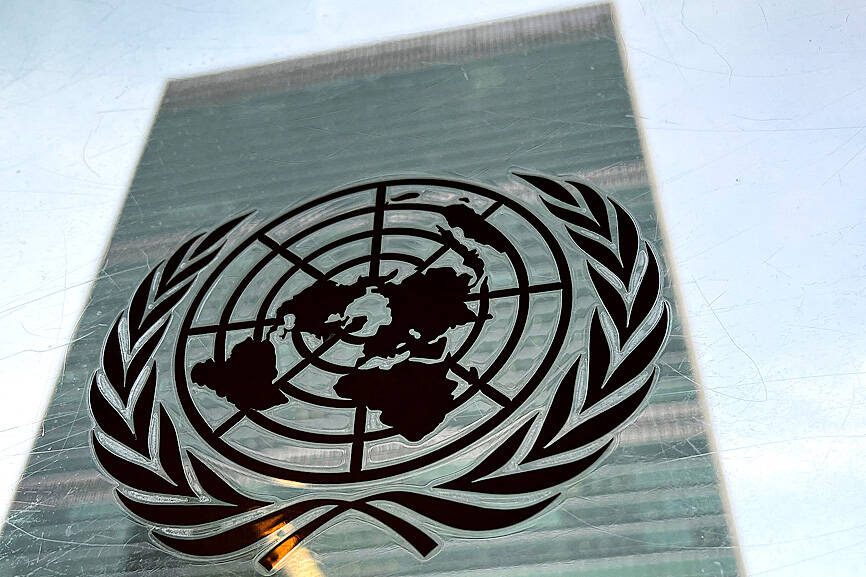Growing numbers of people in Asia lack enough to eat as food insecurity rises with higher prices and worsening poverty, a report released yesterday by the Food and Agriculture Organization (FAO) and other UN agencies said.
Nearly a half-billion people, more than eight in 10 of them in South Asia, were undernourished in 2021, and more than 1 billion faced moderate to severe food insecurity, the report said.
For the world, the prevalence of food insecurity rose to more than 29 percent in 2021 from 21 percent in 2014.

Photo: Reuters
The COVID-19 pandemic was a huge setback, causing mass job losses and disruptions, and the war in Ukraine has pushed up prices for food, energy and fertilizer, putting an adequate diet out of the reach of many millions, it said.
The report is the fifth annual stocktaking on food insecurity and hunger by UN agencies including the FAO, UNICEF, the WHO and the World Food Programme.
Over those years, progress toward alleviating hunger and malnutrition has stalled and then backslid, as growing numbers of people lost the wherewithal to get enough to eat. The prevalence of undernourishment as measured by the UN agencies was 9.1 percent in 2021, better than the 14.3 percent in 2000, but up slightly from 2020.
Such figures show that “the slowdown in the fight against hunger continues,” said the report, which also highlights the growing food insecurity faced by people who have moved into cities, where they have less easy access to affordable food.
“Reforming our agrifood systems to produce nutritious food and ensure equitable access to healthy diets is critical,” it said.
The FAO’s Food Price Index has risen in the past several years, hitting a record in March last year. It fell back as commodity prices declined somewhat later in the year, but is still 28 percent above the 2020 level.
The Asia-Pacific region imports nearly US$2 trillion of food a year. Rising prices for basics like rice, wheat and oil hit the poor the hardest.
It is part of what the UN agencies call the “5F” crisis of not enough food, feed, fertilizer, fuel and financing. The conflict in Ukraine has dealt a heavy blow in many countries that depended on the region for wheat, edible oils and fertilizers.
Nearly 2 billion people — or almost 45 percent of people living in Asia — cannot afford healthy diets, contributing to problems with anemia and obesity, as well as hunger, it said.

DEFENDING DEMOCRACY: Taiwan shares the same values as those that fought in WWII, and nations must unite to halt the expansion of a new authoritarian bloc, Lai said The government yesterday held a commemoration ceremony for Victory in Europe (V-E) Day, joining the rest of the world for the first time to mark the anniversary of the end of World War II in Europe. Taiwan honoring V-E Day signifies “our growing connections with the international community,” President William Lai (賴清德) said at a reception in Taipei on the 80th anniversary of V-E Day. One of the major lessons of World War II is that “authoritarianism and aggression lead only to slaughter, tragedy and greater inequality,” Lai said. Even more importantly, the war also taught people that “those who cherish peace cannot

STEADFAST FRIEND: The bills encourage increased Taiwan-US engagement and address China’s distortion of UN Resolution 2758 to isolate Taiwan internationally The Presidential Office yesterday thanked the US House of Representatives for unanimously passing two Taiwan-related bills highlighting its solid support for Taiwan’s democracy and global participation, and for deepening bilateral relations. One of the bills, the Taiwan Assurance Implementation Act, requires the US Department of State to periodically review its guidelines for engagement with Taiwan, and report to the US Congress on the guidelines and plans to lift self-imposed limitations on US-Taiwan engagement. The other bill is the Taiwan International Solidarity Act, which clarifies that UN Resolution 2758 does not address the issue of the representation of Taiwan or its people in

Taiwanese Olympic badminton men’s doubles gold medalist Wang Chi-lin (王齊麟) and his new partner, Chiu Hsiang-chieh (邱相榤), clinched the men’s doubles title at the Yonex Taipei Open yesterday, becoming the second Taiwanese team to win a title in the tournament. Ranked 19th in the world, the Taiwanese duo defeated Kang Min-hyuk and Ki Dong-ju of South Korea 21-18, 21-15 in a pulsating 43-minute final to clinch their first doubles title after teaming up last year. Wang, the men’s doubles gold medalist at the 2020 and 2024 Olympics, partnered with Chiu in August last year after the retirement of his teammate Lee Yang

The Philippines yesterday criticized a “high-risk” maneuver by a Chinese vessel near the disputed Scarborough Shoal (Huangyan Island, 黃岩島) in a rare incident involving warships from the two navies. The Scarborough Shoal — a triangular chain of reefs and rocks in the contested South China Sea — has been a flash point between the countries since China seized it from the Philippines in 2012. Taiwan also claims the shoal. Monday’s encounter took place approximately 11.8 nautical miles (22km) southeast” of the Scarborough Shoal, the Philippine military said, during ongoing US-Philippine military exercises that Beijing has criticized as destabilizing. “The Chinese frigate BN 554 was